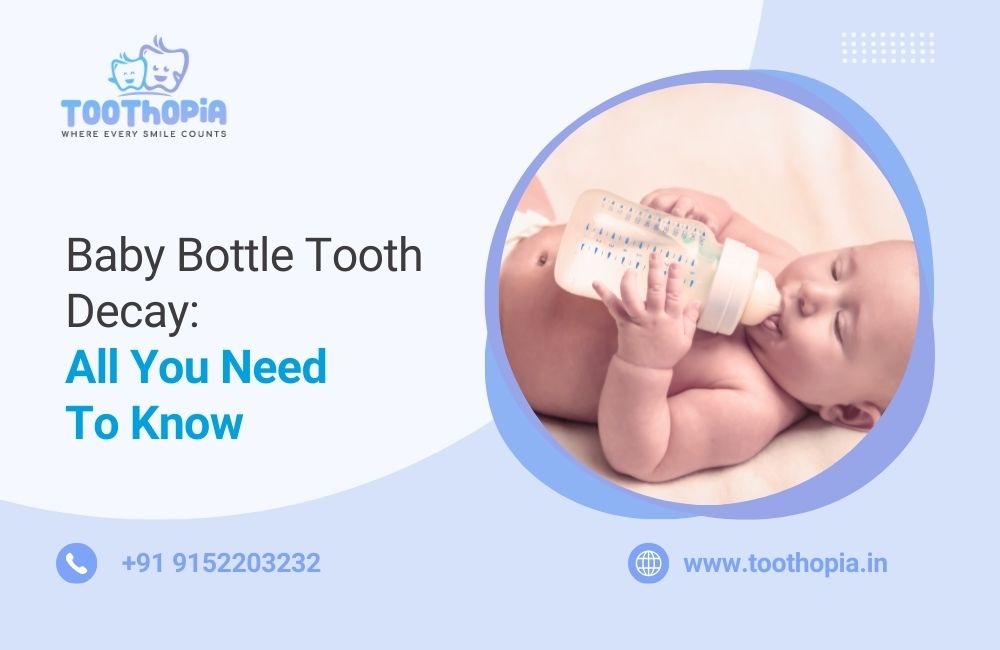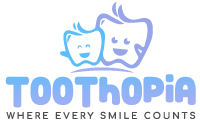As parents, we all want to keep our little one's smile healthy and bright. But as we know, even baby teeth can cause cavities! One of the most common types of cavities that affects infants and toddlers is Baby Bottle Tooth Decay. When left untreated, it can cause pain and affect your child's dental health in the long run. But don't worry! In this blog, we'll break it down in a simple, parent-friendly way—covering what it is, what causes it, and most importantly, how to prevent it.

What is Baby Bottle Tooth Decay?
Baby Bottle Tooth Decay, called Early Childhood Cavities, happens when baby teeth develop cavities. It often affects the front upper teeth, but other teeth can be at risk, too. Since baby teeth play a big role in speech development and chewing, keeping them healthy from the start is important.
What Causes It?
The main culprit? Sugar! When sugary liquids like milk, formula, or juice stay on your baby's teeth for too long, they turn into acids that weaken the enamel, leading to decay. Here are some common habits that can increase the risk:
Nighttime Bottles: Giving a bottle of milk or juice at bedtime means sugar stays on the teeth for hours.
Frequent Sipping: Letting your child sip on sweet drinks throughout the day exposes teeth to constant sugar.
Not Cleaning Teeth Properly: Skipping daily cleaning allows bacteria to thrive.
Sharing Spoons or Pacifiers: If parents or caregivers put a pacifier in their own mouth or share utensils, they can pass cavity-causing bacteria to the baby.
Signs to Watch For
Early detection is key! Keep an eye out for these warning signs:
- White spots on the teeth (this is an early sign of decay!)
- Brown or black spots on the enamel
- Sensitivity or discomfort when eating
- Swollen or red gums
- Bad breath
If you notice any of these signs, it's best to schedule a visit to a pediatric dentist.
Easy Ways to Prevent Baby Bottle Tooth Decay
The good news? This condition is completely preventable with a few simple habits:
Skip the Bedtime Bottle: If your baby needs comfort, offer a bottle of water instead of milk or juice.
Clean Their Mouth Daily: Before teeth even appear, clean your baby's gums with a clean, damp cloth. Once the first tooth pops in, brush it gently with a soft-bristled toothbrush.
Introduce a Cup Early: Start weaning your baby off the bottle by 12 months to reduce prolonged exposure to sugary liquids.
Limit Sugary Drinks: Stick to milk during mealtimes and give water for the rest of the day.
Visit the Dentist Early: Schedule your baby's first visit to the dentist by their first birthday to ensure their teeth are developing properly.
What If My Baby Already Has Cavities?
If your little one develops a Baby Bottle Tooth Decay, don't panic! A pediatric dentist can recommend the best treatment, which may include:
Fluoride Treatments: To help strengthen weak enamel.
Fillings: If cavities are small, they can be repaired with simple fillings.
Crowns: For larger cavities, a crown can protect the tooth.
Tooth Extraction: In severe cases, a badly damaged tooth may need to be removed.
A Healthy Start for a Happy Smile!
Caring for your baby's teeth early on sets the foundation for a lifetime of good oral health. Following these easy tips and making regular dental visits a priority, you can help your child avoid Baby Bottle Tooth Decay. At Toothopia, Dr. Sasmit Choudhary specializes in caring for little smiles, ensuring a fun and comfortable experience for your child. Book an appointment today, and let's keep those tiny teeth shining bright!
